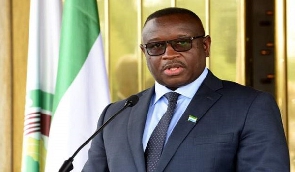Sierra Leone’s President Julius Maada Bio took the oath of office on Tuesday evening to commence a second five-year term after being declared winner in the Saturday, June 24 poll.
Bio, 59, who ran on the ticket of the Sierra Leone People’s Party (SLPP), was re-elected with 56.17 percent of the total votes cast, narrowly beating his closest challenger Dr. Samura Kamara of the main opposition All People’s Congress (APC) and avoiding a run-off.
Kamara, 72, who got 41.16 percent of the votes, has rejected the results, claiming the outcome does not represent the will of the Sierra Leonean people.
Bio was sworn in immediately after he was pronounced the winner by the head of the electoral commission, Mohamed Konneh.
“This has been a peaceful electoral process that has produced an incontestable result that truly reflects the will of the people,” the President said after the swearing-in presided by Chief Justice Desmond Babatunde Edwards in Parliament.
Sporadic violence
The election was marred by reports of delays and sporadic violence in some parts of the country, amid concerns among the opposition of ballot stuffing, among other irregularities.
Bio was challenged by 12 candidates. But the race was mostly between him and Kamara, a former Foreign minister who first attempted the presidency in 2018.
“It is a sad day for our beloved country. It is a frontal attack on our fledgling democracy. These results are not credible and I categorically reject the outcome so announced by the electoral commission,” Kamara said in a statement issued immediately after the results were announced.
The APC had accused the electoral commission of failing to provide a level playing field to ensure free, fair, and credible elections.
Those concerns grew during the counting and tallying of the ballots.
The opposition said there was a lack of transparency in the tabulation of votes process.
Poll observers
The issue of transparency also featured prominently in the reports of international observer groups like the European Union, the Commonwealth and the Carter Center.
“Several delays and shortcomings at key stages of the electoral process occurred and were not comprehensively explained to the public, reducing confidence in the process,” Evin Incir, the Chief EU Elections Observer, said on Monday, after the announcement of partial results that put Bio in the lead.
The EUEOM, in its preliminary reports, also cited intimidation of voters and the heavy-handed response of security forces against opposition supporters. It also noted that the incumbent party had an unfair advantage in its access to State resources used during campaigning, among others.
The head of the Commonwealth Observer Group, former Nigerian Vice President Yemi Osinbajo, said a “lack of clarity around the actual procedure for tallying” had led to the charges of lack of transparency.
'Some hitches'
But the process got a clean bill of health from the African observation missions - the African Union (AU) and the Economic Community of West African States (Ecowas).
The heads of the two missions said while some hitches characterized the process, it was generally free and fair.
“Overall, AUEOM observed that elections were conducted in a generally peaceful, transparent and credible manner, up to the counting on polling day, despite reported incidents of violence particularly during the pre-election period,” said former Ethiopian Prime Minister, Hailimariam Desalegn, who headed the AU Observer mission.
His Ecowas counterpart, Mohamed Ibn Chambers, said: “The mission notes that despite some early challenges, polling generally proceeded smoothly and in a largely peaceful atmosphere, and eligible voters were able to freely participate in the process.”
Local observers
But the process got a clean bill of health from the African observation missions - the African Union (AU) and the Economic Community of West African States (Ecowas).
The heads of the two missions said while some hitches characterized the process, it was generally free and fair.
“Overall, AUEOM observed that elections were conducted in a generally peaceful, transparent and credible manner, up to the counting on polling day, despite reported incidents of violence particularly during the pre-election period,” said former Ethiopian Prime Minister, Hailimariam Desalegn, who headed the AU Observer mission.
His Ecowas counterpart, Mohamed Ibn Chambers, said: “The mission notes that despite some early challenges, polling generally proceeded smoothly and in a largely peaceful atmosphere, and eligible voters were able to freely participate in the process.”
But it’s not only the international observers who were concerned about the process leading to the outcome. A local observer group, the National Elections Watch, a coalition of civil society and NGOs that monitors elections in the country, said on Tuesday that its data showed that none of the two leading candidates got enough votes to avoid a run-off.
By law, a candidate must have at least 55 percent of the total votes count to be declared the winner of the presidential race.
The SLPP was keen on avoiding a run-off, which could have significantly reduced Bio’s chance of winning.
The electoral commission chief though said that aggrieved parties seeking to challenge the results in court have seven days to do so as per the Constitution.
Africa News of Wednesday, 28 June 2023
Source: aljazeera.com

















